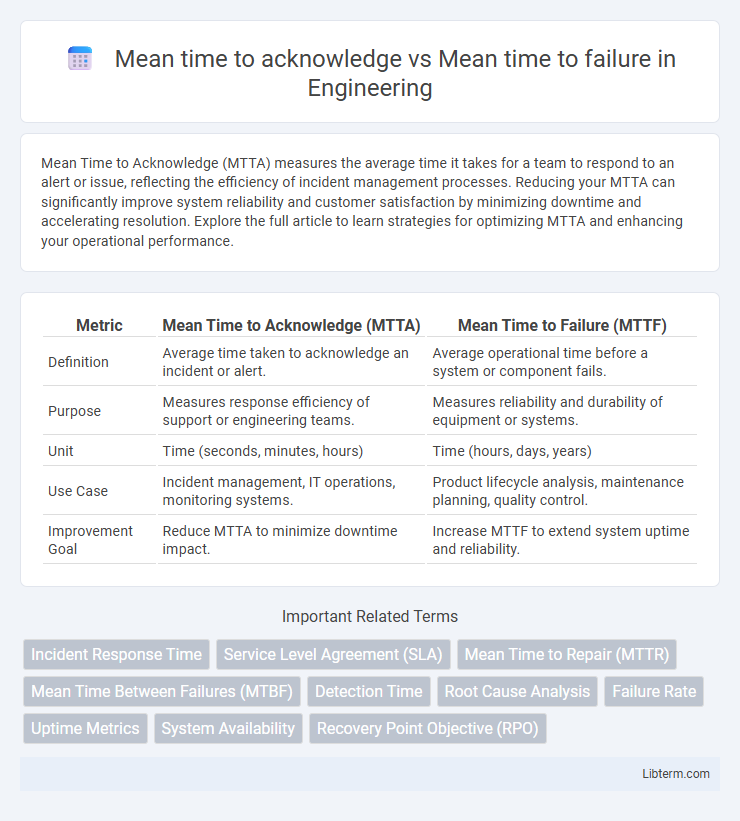Mean Time to Acknowledge (MTTA) measures the average time it takes for a team to respond to an alert or issue, reflecting the efficiency of incident management processes. Reducing your MTTA can significantly improve system reliability and customer satisfaction by minimizing downtime and accelerating resolution. Explore the full article to learn strategies for optimizing MTTA and enhancing your operational performance.
Table of Comparison
| Metric | Mean Time to Acknowledge (MTTA) | Mean Time to Failure (MTTF) |
|---|---|---|
| Definition | Average time taken to acknowledge an incident or alert. | Average operational time before a system or component fails. |
| Purpose | Measures response efficiency of support or engineering teams. | Measures reliability and durability of equipment or systems. |
| Unit | Time (seconds, minutes, hours) | Time (hours, days, years) |
| Use Case | Incident management, IT operations, monitoring systems. | Product lifecycle analysis, maintenance planning, quality control. |
| Improvement Goal | Reduce MTTA to minimize downtime impact. | Increase MTTF to extend system uptime and reliability. |
Introduction to Mean Time to Acknowledge (MTTA) and Mean Time to Failure (MTTF)
Mean Time to Acknowledge (MTTA) measures the average duration between the detection of an incident and the initial response by the support or operations team, reflecting responsiveness in IT service management. Mean Time to Failure (MTTF) indicates the expected operational time of a non-repairable system or component before it fails, serving as a key reliability metric in product lifecycle analysis. Both MTTA and MTTF are essential for optimizing maintenance strategies and improving system availability and performance.
Understanding the Key Differences Between MTTA and MTTF
Mean Time to Acknowledge (MTTA) measures the average time taken to recognize and respond to an incident, crucial for improving operational responsiveness and minimizing downtime. Mean Time to Failure (MTTF) represents the expected operational lifespan of a system or component before a failure occurs, essential for predicting reliability and planning replacements. Distinguishing between MTTA and MTTF helps organizations optimize incident management processes while maintaining asset performance and system availability.
Importance of MTTA in Incident Management
Mean Time to Acknowledge (MTTA) is critical in incident management as it measures the average time taken for a team to recognize and respond to an incident, directly impacting the speed of resolution. In contrast, Mean Time to Failure (MTTF) indicates the expected operational time before a system failure occurs but does not influence the immediacy of incident response. Prioritizing MTTA enables organizations to reduce downtime, improve service reliability, and enhance customer satisfaction by accelerating the initial incident acknowledgment process.
The Role of MTTF in System Reliability
Mean time to failure (MTTF) quantifies the expected operational lifespan of non-repairable systems before failure occurs, serving as a critical indicator of product durability and reliability. Unlike mean time to acknowledge (MTTA), which measures response time to incidents, MTTF directly impacts system design by guiding maintenance schedules and improving fault tolerance strategies. High MTTF values correlate with enhanced system reliability, reducing downtime and optimizing lifecycle costs.
Calculating MTTA: Steps and Best Practices
Calculating Mean Time to Acknowledge (MTTA) involves measuring the average duration from when an incident is detected until it is acknowledged by the response team, which requires precise timestamp tracking of alert generation and acknowledgment events. Accurate MTTA calculation relies on automated monitoring tools, real-time alerting systems, and well-documented incident logging to ensure data integrity and actionable insights. Following best practices such as setting clear acknowledgment protocols, regularly reviewing response workflows, and integrating MTTA metrics into performance dashboards helps optimize incident management and reduce overall Mean Time to Failure (MTTF).
Measuring MTTF: Methods and Metrics
Mean Time to Failure (MTTF) quantifies the average operational lifespan of non-repairable systems before failure, essential for reliability assessments. Measuring MTTF involves collecting failure data through accelerated life testing, failure rate analysis, and reliability modeling to predict system durability accurately. Key metrics include failure distribution patterns and hazard rates, which provide insights into underlying wear-out mechanisms.
How MTTA Impacts Service Level Agreements (SLAs)
Mean Time to Acknowledge (MTTA) directly impacts Service Level Agreements (SLAs) by measuring the speed at which a support team recognizes and responds to incidents, which determines the initial phase of issue resolution. A shorter MTTA ensures quicker incident acknowledgment, reducing customer downtime and enhancing SLA compliance by meeting response time commitments. In contrast, Mean Time to Failure (MTTF) relates to system reliability but does not influence the responsiveness metrics critical for SLA adherence.
MTTF’s Influence on Product Lifecycle and Maintenance
Mean Time to Failure (MTTF) measures the average operational lifespan of a non-repairable product before failure, directly influencing the product lifecycle by determining expected durability and replacement schedules. Understanding MTTF allows manufacturers to optimize maintenance strategies by predicting failure points and minimizing downtime, thus enhancing overall reliability and customer satisfaction. In contrast, Mean Time to Acknowledge (MTTA) focuses on response speed to incidents but does not impact product longevity or maintenance planning as fundamentally as MTTF does.
Strategies to Improve MTTA and MTTF Metrics
Improving Mean Time to Acknowledge (MTTA) requires implementing automated alerting systems and streamlined incident response protocols to reduce detection and notification delays. Enhancing Mean Time to Failure (MTTF) involves proactive maintenance schedules, rigorous component testing, and deployment of high-reliability hardware to extend system operational lifespan. Continuous monitoring combined with data analytics helps identify failure patterns and optimize both MTTA and MTTF for improved system resilience.
Choosing the Right Metric: MTTA vs MTTF for Your Organization
Mean Time to Acknowledge (MTTA) measures the average time taken to respond to an incident, highlighting operational efficiency in issue detection and initial reaction. Mean Time to Failure (MTTF) tracks the average duration a system operates before failing, focusing on reliability and predicting system lifespan. Organizations must prioritize MTTA for enhancing incident response workflows and MTTF for improving system design and maintenance planning, aligning metric choice with specific operational goals.
Mean time to acknowledge Infographic

 libterm.com
libterm.com